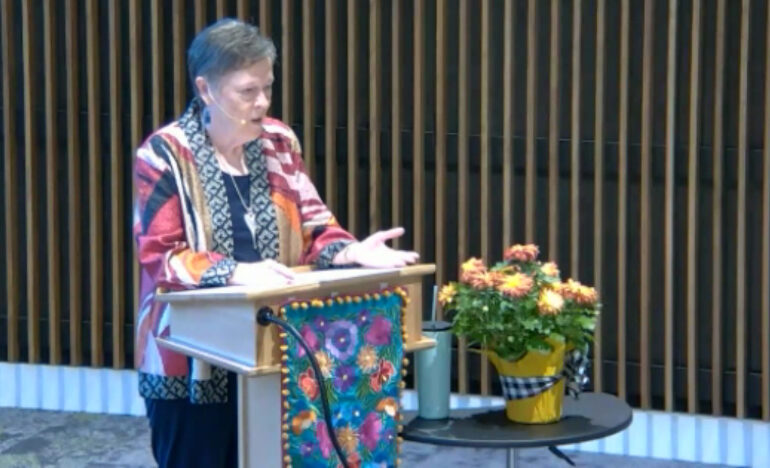What Muslims can teach Christians about prayer

By Kathy Keary
Part 15. The full series is here: The Contemplative Spirit of Islam.
For the last several weeks, we’ve been comparing different aspects of contemplative living as found in Christianity and Islam. We discussed the reasons for this exploration at the beginning of this journey, and after we had explored the parallels of Christian and Buddhist contemplative living. We said,
“Growing in an understanding of diverse faiths fortifies a sense of unity among people. This pursuit promotes peace and respect among the various cultures of the world contributing to the building up of society at large.
“Throughout his papacy, Pope Francis has championed interfaith discourse as a means to achieve peace and conflict resolution among …
“The impetus behind interfaith exploration is not for the sake of conversion. As a matter of fact, learning the treasures offered in other cultures has the propensity to strengthen one’s appreciation for their own faith.”
With that as background, let’s return our focus to the five pillars of Islam (Reminder: The Five Pillars of Islam are Profession of Faith, Prayer, Almsgiving, Fasting and Pilgrimage.) Today we study the second pillar, prayer.
Several years ago, I was blessed with an opportunity to visit Istanbul, a city that enjoys a predominantly Muslim population. I distinctly recall hearing the call to prayer throughout the day from a minaret, a tower that stands adjacent to a mosque. A muezzin, or crier, calls the people to prayer five times each day, in the morning and evening but also at midday, late afternoon and sunset. The reverence exhibited when the community is called to prayer is awe-inspiring.
Below is a video of the virtual Iftar Dinner that Precious Blood Renewal Center and the Dialogue Institute of Kansas City celebrated during Ramadan in April of this year. The video is cued to begin at a recording of six imams on three continents making the call to prayer. If you get a chance, take a listen. It is only a few minutes long.
The five daily prayer times are known as the salat. This practice is among the most important obligations in Islam. An ablution is performed prior to prayer, which involves ritual washing parts of the body exposed to dirt and recitation of a prayer asking for forgiveness, mercy, and guidance. Jamal Rahman describes the ablution as “symbolizing the yearning of the human soul to be cleansed and purified before standing intentionally in the presence of God” (Out of Darkness, 169).
During Muhammad’s Night Journey, he witnessed scores of angels bowing and prostrating to Allah as words of praise and thanksgiving flowed from their mouths. The Prophet used this as the model for prayer. Muslims engage their bodies as they pray by standing, bowing, prostrating, and sitting on their knees symbolizing their surrender to God. Rahman explains the rationale for prostrating when praying:
Mystics have pointed out that by prostrating to the ground in submission and supplicating heavenward, we are probing spaces where the veils between humanity and God are especially thin and the forces of darkness are not lurking to intercept our prayers (Out of Darkness, 170).
One may be tempted to skip morning prayer as it occurs before sunrise; however, Rahman encourages his followers to be true to this Islamic practice:
The Qur’an extols the beauty of praying in the “small watches of the night” when “impressions are strongest and words are most eloquent” (73:6). Mystics believe the veils between visible and invisible worlds are like gossamer in the wee hours. In Rumi’s beautiful imagery, it is as if “a dawn breeze has blown away the veil from the Face of God” (Gems, 109).
The prayer consists of the recitation of verses of praise and thanksgiving from the Qur’an. Muslims conclude prayer time by turning their heads to both the right and the left to greet the host of angels who gather in holy places. They ask God to bless their family, friends, and themselves by cupping their palms and lifting them toward the heavens. Rahman describes a beautiful picture of this universal prayer: “As the Earth revolves through one time zone after another, an unceasing wave of Muslims bowing to God turns the planet into a magnificent prayer rug” (Out of Darkness, 169).
Engaging one’s body in prayer is not a characteristic of only the Islamic tradition. This practice finds a home in diverse faith traditions around the world. I refer you to our article on this topic written from a Christian perspective: Using Our Bodies in Prayer.
So how was it decided that Muslims should pray five times per day? The story goes that this is the number that God and Muhammad agreed upon during the Night Journey after negotiations that were encouraged by Moses in his conversations with Muhammad during his descent from the heavens. Reportedly, God originally suggested that we pray 50 times each day which brings to mind St. Paul’s mandate to “pray without ceasing.” Moses was adamant that the people would not pray that much and sent Muhammad back to haggle with God (Out of Darkness, 170).
Note: Never miss an article published on the Renewal Center website: Sign up to receive our newsletters.
Friday is the holy day of the week for Muslims which is called Junaah in Arabic, which is translated as “gathering.” It is customary to gather midday for prayer and fellowship. It is believed that angels are in full force blessing those that are praying. God spoke these words to Muhammad: “I remember every devotee who remembers Me but I remember even better when devotees remember Me in a group.” The value of communal worship is a common thread running through the major faith traditions.
As you can well imagine, there is much more to be said about prayer in the Islamic tradition. We will continue our coverage of this topic next week.
References
Rahman, Jamal; Elias, Kathleen Schmitt; and Redding, Ann Holmes. Out of Darkness into Light: Spiritual Guidance in the Quran with Reflections from Christian and Jewish Sources. Harrisburg, New York: Morehouse Publishing, 2009.
Rahman, Jamal. Spiritual Gems of Islam: Insights and Practices from the Qur’an, Hadith, Rumi and Muslin Teaching Stories to Enlighten the Heart and Mind. USA: Skylight Path Publishing, 2013.
[Kathy Keary, a Precious Blood Companion and spiritual director, holds a master’s degree in theological studies and is a graduate of the Atchison Benedictine’s Sophia Center’s Souljourners Program, an intense study of spirituality and spiritual direction. Kathy believes that the divine is present and active in all of life and encourages others to be awakened to the God in all including the divine within. She enjoys accompanying others on their journey to wholeness discovering the person they were created to be.]
Phot ID 199184887 © LakshmiPrasad Lucky | Dreamstime.com
We’d Like to Hear from You!
We’d like to know what you think about this article. Send us a comment using the form below. Do you have a suggestion? Is there something you want to learn more about? Send us a note
Related

Discover Lectio Divina
Presented by Kathy Keary
This is a recording of “Discover Lectio Divina” presented by Kathy Keary at Precious Blood Renewal Center in Liberty, Missouri, on Oct. 2, 2025.

Do You Hear What I Hear?
By Fr. Garry Richmeier, C.PP.S.
How can we avoid the harmful affects of the polarization that characterizes so much of our lives these days? One step toward this end is to cultivate a greater understanding and appreciation for the idea of relativity in human behavior.
Categories
Assembling God's Puzzle Coffee with Padre Cooking & Spirituality Encounters of the 4th Kind Family Matters Guided Meditations Reflections on the Eucharsitic Prayers Spiritual Resources Taize Prayers Teach Us to Pray The Contemplative Life Traveling with Pilgrims of Hope Uncategorized Videos Week of Prayer for Christian Unity When you need a little help
